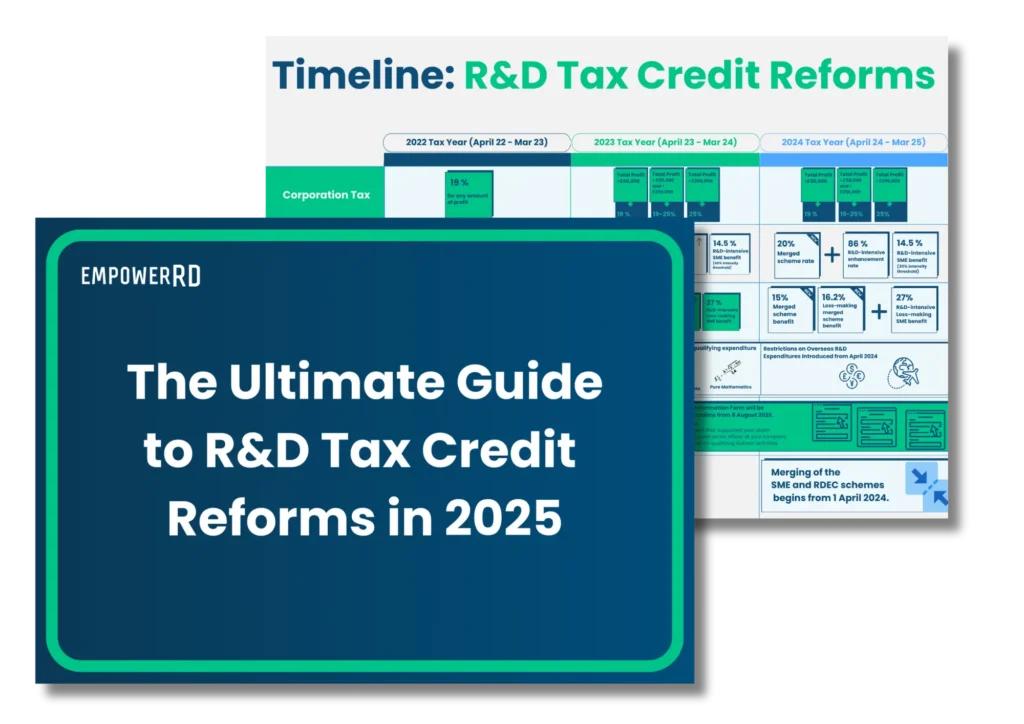Yesterday, Chancellor Rachel Reeves presented Labour’s first Autumn Budget since returning to power, addressing the UK’s £22 billion fiscal shortfall with a balanced approach of cost-saving measures and strategic investments. With £100 billion allocated for R&D, infrastructure, and technology over the next five years, the Budget aims to drive growth while maintaining stability.
For innovative companies, the unchanged R&D tax relief provides a much-needed respite from recent reforms, allowing companies to confidently use these incentives to support growth. Additionally, changes in employer NICs, CGT, and inheritance tax present new considerations for businesses.
EmpowerRD’s analysis delves into the Budget’s impact on R&D-focused companies and the UK’s innovation landscape.
Innovation and R&D Tax Relief
Stability in R&D Tax Relief
To ensure continuity for companies, the Autumn Budget 2024 will not introduce further changes to the R&D tax relief scheme, providing a welcome pause after a period of significant change. This stability supports businesses in technology, life sciences, and manufacturing, enabling them to continue using R&D tax credits as a reliable tool for funding innovation and growth.
At EmpowerRD, we appreciate this stabilising approach, especially after recent reforms forced many businesses to adjust. Stability in the R&D tax relief scheme enables innovative companies to confidently plan for the future, allowing them to concentrate resources on advancing their projects instead of dealing with constant change.
Strengthened compliance and fraud reduction
A corporate report titled Approach to Research and Development Tax Relief 2023 to 2024, published alongside the budget, highlights positive news, the success of HMRC’s Mandatory Random Enquiry Programme (MREP) in reducing fraud and errors in R&D tax claims. By meticulously reviewing sample claims, the error and fraud rate impressively dropped from 17.6% in 2021-2022 to 7.8% in 2023-2024.
Among SMEs, the error rate decreased to 14.6%, demonstrating the effectiveness of targeted interventions. These measures safeguard against misuse while ensuring eligible businesses continue to benefit from R&D tax credits, reinforcing the government’s commitment to value and economic impact.
It’s good to see these improvements reflecting the importance of maintaining integrity in the scheme.
£100 Billion Capital Investment Commitment
The government’s plan to invest over £100 billion in capital over the next five years is promising, with a focus on R&D, housing, science, and transport. This investment underscores a vision for long-term economic growth and infrastructure enhancement, channelling substantial resources into R&D-driven enterprises. Both emerging startups and established innovators stand to benefit from this new capital.
Targeted funding for science and technology growth sectors
Significant allocations include £975 million for aerospace R&D, £2 billion for zero-emission vehicle production, and up to £520 million for the Life Sciences Innovative Manufacturing Fund, supporting the UK’s leadership in innovation.
Green Innovation and Sustainability Incentives
With the UK’s net-zero targets as a priority, the Budget offers extra incentives for businesses innovating in green technology. Companies focused on carbon reduction, renewable energy, and sustainable practices will have greater access to grants and enhanced capital allowances. These measures show the government’s commitment to environmental sustainability and economic growth, opening new funding paths for eco-friendly innovation.
Business tax changes for innovative companies
Increase in Employer National Insurance Contributions (NICs)
One significant tax change is the increase in the employer NICs rate, which will rise by 1.2 percentage points to 15% on 6 April 2025, accompanied by a threshold reduction from £9,100 to £5,000 per year. This change raises operating costs for businesses, especially those with large employee numbers or ambitious hiring plans. For companies focused on innovation, where expanding teams is crucial for growth and meeting R&D goals, this increase could slow down headcount growth, particularly in expensive, skilled roles in tech and R&D.
To help alleviate these costs, the Employment Allowance will increase to £10,500, offsetting NICs for small businesses and ensuring that 865,000 employers won’t pay NICs next year. Although this is great news for smaller businesses, larger companies or those aiming for rapid growth may still feel the pinch, requiring careful planning to maintain growth without facing overwhelming costs.
Updated capital allowances
The government has confirmed the continuation of full expensing for capital expenditures, allowing companies to deduct 100% of these expenses in the year they occur. This support makes significant investments, such as infrastructure or R&D facilities, more financially feasible for innovation-driven businesses. By providing immediate deductions, the full expensing measure improves cash flow, enabling companies to reinvest more quickly into technology, infrastructure, and growth initiatives.
Personal tax adjustments for founders and investors
Capital Gains Tax (CGT) Increases
The Budget introduces changes to Capital Gains Tax (CGT) rates, increasing the lower rate from 10% to 18% and the higher rate from 20% to 24%, effective immediately. For business founders and investors in innovative sectors, these changes might slightly affect exit strategies and tax planning. However, the phased increase for Business Asset Disposal Relief and Investors’ Relief rates to 14% by 2025, aligning with the main lower rate of 18% by 2026, offers time to adjust.
Although these adjustments may influence planning, especially for long-term investors, the UK’s overall competitive CGT rates ensure it remains an attractive destination for R&D-intensive investments. Despite the increases, innovative companies can still benefit from the UK’s broader support for R&D through stable tax relief and capital allowances, which continue to provide strong incentives for growth-focused sectors.
Changes to Inheritance Tax (IHT)
The Budget also addresses inheritance tax, introducing measures to tax unspent pension pots and limit the scope of Agricultural and Business Property Relief. These changes are likely to create new tax liabilities for company founders and investors planning succession or legacy strategies. For those wishing to pass down business assets, these reforms add complexity, requiring proactive planning to ensure family and business continuity.
Last thoughts…
The Autumn Budget 2024 provides much-needed stability in R&D tax relief, offering a positive outlook for companies navigating recent reforms. The government’s commitment to a £100 billion investment lays a robust foundation for growth in high-impact sectors such as green technology and life sciences.
However, the increase in employer NICs may present challenges for businesses, particularly larger ones with ambitious R&D plans, as they aim to expand their workforce. Balancing these tax increases with the stability offered by R&D relief will be crucial for innovative companies striving to sustain their growth and innovation momentum.
If you have any questions, please don’t hesitate to get in touch with one of our team today.












